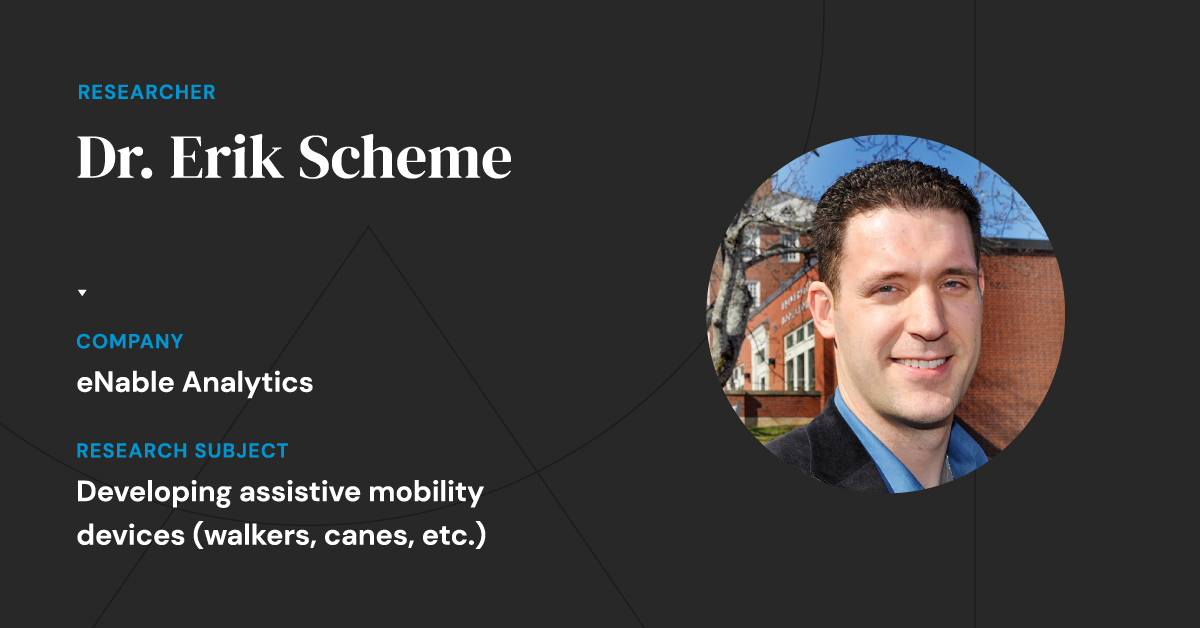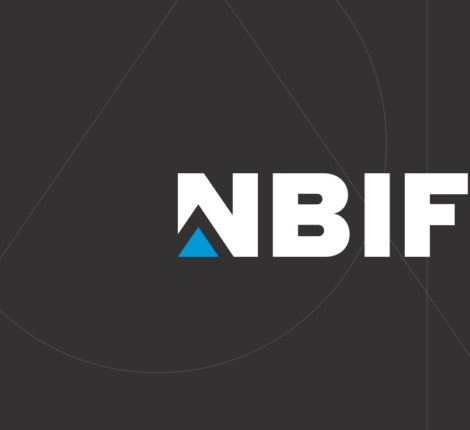- June 1, 2021
- Applied Research
- Comments : 0
ESCF Mobilizes Startup Creating Smart Mobility Devices

Paul Thornton
Senior Commercialization Officer
The road to recovery following orthopedic or spinal surgery is not only long—it’s also filled with fear and anxiety. As patients start to get mobile, they’re not sure whether they’re moving in a way that will promote or deter healing.
Those first few steps post-op are so daunting. How much weight is safe to put on that left foot? Am I holding my hip in the right position? What if I fall?
These are the kinds of questions that run through a patient’s mind. And so, they should because as many as 40% of hip and knee surgeries fail, often because of inadequate oversight during recovery. The pandemic has intensified this risk and concern because patients now must rely mainly on phone or Internet consults as they recuperate.
Since 2013, a team of New Brunswick engineers has been working on a way to help patients guide themselves back to health. They’ve invented a number of “smart” mobility devices, such as canes and walkers, equipped with tiny sensors. The sensors provide data about a patient’s movement patterns and their environment. This real-time information can help them determine what’s safe and unsafe for them to do. It can also enable clinicians to monitor progress and conduct in-depth assessments, without any in-person contact.
Dr. Erik Scheme, Director of the UNB Health Technologies Lab, has been leading the innovative research that has resulted in the prototype smart devices. In August 2020, Scheme and his student Alex Roberts founded a startup, eNable Analytics, with the goal of launching a market-ready product.
To do that, they needed financing to develop a product that would meet the requirements of clinicians, patients, and healthcare regulators. To move from the lab out into the community would require a new kind of research: investigation into customer needs and preferences. It would also call for extensive market research to determine the kinds of healthcare situations that could best benefit from smart mobility devices and would be the most profitable. Additionally, there would be complicated regulatory hoops and approvals to jump through, in both Canada and the US.
Through a grant from the Early Stage Commercialization Fund, Scheme and Roberts have now embarked on the journey from academic research to entrepreneurship. In our spring 2021 competition, they received the full $50,000 available through the program. With these funds, they are now mobilizing their body of work and turning it into a viable business.
eNable Analytics is ready to carve the path to commercialization because of the strong collaborative relationships they’ve formed within the Atlantic healthcare ecosystem. It’s well-known that New Brunswick has an aging population; the growing proportion of seniors is often cited as a troubling statistic that poses challenges for our workforce and our healthcare system. But we also have a flourishing base of researchers and practitioners working with the geriatric population. eNable is tapping into that network, building relationships with such organizations as the Stan Cassidy Centre for Rehabilitation and the Canada East Spine Centre, an institution that has over 2700 patients registered with the Canadian Spine Outcomes and Research Network (CSORN) and over 3500 hip/knee surgeries a year.
Trends in technology and machine learning should also add momentum to eNable’s progress. COVID-19 has fostered innovation in these fields as well as in e-health and data tracking. Smart mobility devices are becoming smarter and smarter, and the digital advances sparked by the pandemic will continue to develop once the world has been vaccinated.
The ECSF grant has given Scheme, Roberts, and their team an opportunity to build on the remarkable work they’ve been doing over the past eight years and share their ingenuity with the North American market. Their motivation, they say, is to give their users the power to “take control of their safety and rehabilitation, giving them peace of mind… one step at a time.”
So what are the next steps for eNable Analytics? They’re using ECSF funds to develop two software applications: one that will facilitate a demo for clinicians and one that will be a platform for eventual customers in specific markets. At the same time, they’re engaged in customer discovery, interacting with end users and clinicians to find out what the real needs are and what exact combination of devices, software, and data-tracking will solve them.
eNable Analytics has the potential to deliver tremendous value to the growing number of patients undergoing surgery due to chronic conditions and age-related falls. In Canada alone, doctors now perform more than 137,000 hip and knee surgeries a year. How many of those patients could have a safer, shorter recovery time thanks to a smart mobility device? How many of those surgeries might be prevented if people at risk of falling had access to a smart cane or walker?
These are important, life-changing questions to ask, and ESCF has enabled one New Brunswick startup to begin finding the answers.


